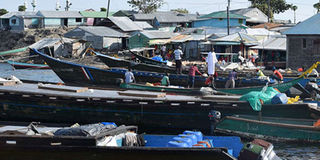Fishermen lose up to Sh1bn due to floods

Fishermen in Remba Island. PHOTO | FILE | NATION MEDIA GROUP
What you need to know:
- In Migori, in the mainland, fisherfolk at several beaches claim they could no longer ply their trade as most beaches are submerged.
- Mr Maulid said fish prices have also declined as there are no more storage facilities and their catches end up getting destroyed.
The rising water level in Lake Victoria has disrupted fishing activities across counties bordering the water resource, undermining production.
The fishing community across the lake region has reported losing over Sh1 billion in fish sales and destroyed fishing structures and equipment following the backflow in the lake.
For more than six months, the fishing business has suffered because of increasing water levels in the lake, which have destroyed fishing equipment and structures.
The backflow has also displaced fishermen from landing sites and beaches, which have been covered by water.
Remba Island in Homa Bay used to be a beehive of activity, where fishermen would be busy day and night. But that is no more.
Homa Bay County Beach Management Units chairman Edward Oremo said many fishermen have abandoned fishing because of reduced catches.
In Homa Bay, fishermen estimate losing more than Sh300 million in fish sales amid the devastating effects of the rising waters, beach managers said.
In Migori, in the mainland, fisherfolk at several beaches claim they could no longer ply their trade as most beaches are submerged.
PRICES DIP
The Muhuru, Mugabo, Senye, Kao, Kibro and Lwanda Konyango beaches are affected, with beach management officials saying their fishing gear, stores and fish-cooling plants were destroyed.
“We are counting losses running into millions. All the cooling plants and fishing gear have been destroyed. Stores that we used to stock our catch are also filled with water,” said Kibro BMU chairman Maulid John.
Mr Maulid said fish prices have also declined as there are no more storage facilities and their catches end up getting destroyed.
Fishermen estimate property worth Sh500 million has been destroyed by high tides in the lake and the backflow.
Nyanza Regional Beach Management Unit chairman Tom Guda said the waters have moved almost 100 metres into the fish-landing sites and destroyed structures.
“Because of the pressure of the high tide, many boats which were docking at the landing sites have been dismantled. Currently, there are minimal activities at the lake for fear of boats capsizing,” he said.
Some of their drying structures for omena and residences made of iron sheets have been destroyed.
FIND ALTERNATIVES
Most fishermen have abandoned the trade after their boats were destroyed and some of them displaced from their homes, Mr Oremo said.
Some fishermen have ventured into other forms of agriculture because of risks associated with fishing.
“Some fishermen have become crop farmers. Others have gone into the jua kali sector because of reduced catches. We estimate a loss of more than Sh300 million.”
Homa Bay has 132 beaches, which have all been affected by the rising water levels.
Evidence of reduced catches can also be witnessed on Remba Island, one of the main producers of fish on Lake Victoria.
The island, hours away from Mbita town, has a surface area of one square kilometre, with more than 6,000 people, including Ugandan and Tanzanian nationals.
The rocky island - like others such as Migingo, which are close to the boundaries of the three East African countries - is known for producing large quantities of fish.
Authorities from Kenya, Uganda and Tanzania have often claimed ownership of these islands because of they are rich in fish. But now fish production is under threat.
FISH PONDS
Officials from the Kenya Red Cross visited the area and distributed tents to affected families. Fearing that the island could be submerged, some fishermen packed up and left.
Landing sites have been swallowed up by the lake water and fishermen now must anchor their boats using heavy rocks, said Moses Oulu, who has operated two fishing boats on Mageta Island in Siaya for seven years.
“It is very risky when you leave the boat anchored by a heavy stone because it can easily be destroyed by the strong waves. Many fishermen have lost their boats and gear in this manner,” he says.
Area Chief Ambrose Ogema said an estimated 5,000 fishermen operating at the Sika, Mahanga, Mtundu, Magare, Kwoyo and Wakawaka beaches now have no place to land their daily catch.
Agriculture and Fisheries executive Aguko Juma said the backflow has also affected ponds along the lake. “Some farmers had established fish ponds along the lake. All fish in the ponds were swept onto the lake water level rose.”


